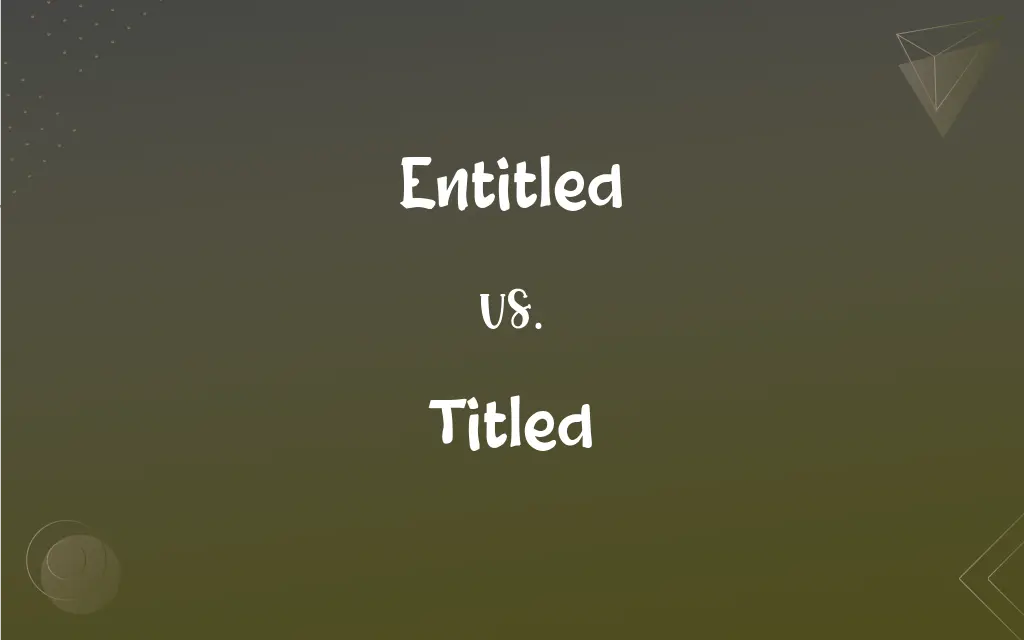Entitled vs. Titled: What's the Difference?
Edited by Aimie Carlson || By Harlon Moss || Updated on October 22, 2023
Entitled means having a right to something; titled refers to the name of a book, article, etc.

Key Differences
The word "entitled" often denotes a belief or feeling that one is deserving of certain privileges or rights. In contrast, "titled" is generally used to specify that something, such as a book or artwork, has been given a particular name or title.
While "entitled" can carry a negative connotation, suggesting that someone may be overly demanding or presumptuous about their rights, "titled" is neutral, merely indicating the presence of a title. For example, a person might feel "entitled" to a promotion, while a novel might be "titled" "War and Peace."
It's also worth noting that "entitled" can mean that someone is legally conferred a specific right. In this sense, it's factual and neutral, akin to "titled." For instance, a person can be entitled to certain benefits under the law. Conversely, when referring to a book or film, "titled" simply denotes its name.
In some contexts, "entitled" can be synonymous with "titled," especially when referring to a work's designation. For instance, a movie entitled "The Dark Knight" is also a movie titled "The Dark Knight." However, it's more common to use "titled" in such instances.
In daily usage, it's crucial to be aware of the nuances of each word to convey the intended message. Using "entitled" when "titled" is meant, or vice versa, can change the meaning or tone of a statement.
ADVERTISEMENT
Comparison Chart
Primary Meaning
Having a right to something
The name given to a work or piece of art
Connotation
Can imply presumption or demanding
Neutral
Use in Literature
Refers to one's belief in deserving something
Refers to the naming of a work
Synonym Context
Can be synonymous with "titled" when referring to naming
Often used for naming, rarely synonymous with "entitled"
Grammatical Role
Often an adjective or verb
Typically an adjective or past tense verb
ADVERTISEMENT
Entitled and Titled Definitions
Entitled
Given a right to something.
She is entitled to her inheritance.
Titled
Designated or referred to by a particular name.
The painting is titled Starry Night.
Entitled
Given a particular title or designation.
The documentary is entitled Nature's Wonders.
Titled
Having been given a name or title.
The book is titled Mysteries of the Deep.
Entitled
Believing oneself to be inherently deserving of privileges or special treatment.
Some kids act so entitled these days.
Titled
Having been awarded a particular honor or distinction.
The titled champion of the tournament.
Entitled
Legally qualified or authorized.
As a resident, he's entitled to certain benefits.
Titled
Holding a particular title, especially a noble title.
The titled aristocracy of the region.
Entitled
Obligated as a right or privilege.
Employees are entitled to vacation days.
Titled
Denoting the name or title of a work of art or literature.
Every song on the album is uniquely titled.
Entitled
To give a name or title to.
Titled
Having a title, especially a noble title.
FAQs
How about "titled"? What part of speech is it?
Typically an adjective or past tense verb.
What part of speech is "entitled"?
It's often an adjective or verb.
Is "entitled" always negative?
No, "entitled" can be neutral, like being legally conferred a right. It can also imply presumption, depending on context.
Is every book "entitled"?
Every book has a title, so it can be said to be "entitled" with that name. However, "titled" is more commonly used.
Can "entitled" and "titled" be used interchangeably?
Sometimes, especially when referring to naming a work. However, "titled" is more common in this context.
Are there situations where it's wrong to use "entitled" instead of "titled"?
Yes, especially when the meaning revolves around presumption versus mere naming. Context is key.
Does "titled" only refer to books?
No, "titled" can refer to any work, art, or individual holding a title.
Does "entitled" mean someone is arrogant?
Not always. While it can imply presumption, it can also mean having a rightful claim.
Can "entitled" refer to legal rights?
Yes, someone can be entitled to benefits or rights under the law.
Can a movie be "titled"?
Absolutely. A movie can have a title, so it's "titled" with that name.
Is "entitled" always about belief?
No, it can also be about factual or legal rights.
Does "titled" always imply nobility?
No, it can refer to any naming or holding of a title, not just noble titles.
Which is more common: a book "entitled" or "titled"?
Both are correct, but "titled" is more commonly used.
Can "titled" refer to an achievement?
Yes, like someone being the "titled" champion of a competition.
Are "entitled" and "titled" synonyms?
In some contexts, especially naming, they can be. But they often have distinct meanings.
Which word is older: "entitled" or "titled"?
Both have old origins, but the exact age depends on their specific historical uses.
Can a person be "titled"?
Yes, especially in the context of nobility or holding a specific honor.
Can "entitled" mean that someone has given something a title?
Yes, like a documentary "entitled" a certain name.
Can an article be "titled"?
Yes, any piece of work with a name can be "titled" with that name.
Is "entitled" more about feelings or rights?
It can refer to both, depending on context.
About Author
Written by
Harlon MossHarlon is a seasoned quality moderator and accomplished content writer for Difference Wiki. An alumnus of the prestigious University of California, he earned his degree in Computer Science. Leveraging his academic background, Harlon brings a meticulous and informed perspective to his work, ensuring content accuracy and excellence.
Edited by
Aimie CarlsonAimie Carlson, holding a master's degree in English literature, is a fervent English language enthusiast. She lends her writing talents to Difference Wiki, a prominent website that specializes in comparisons, offering readers insightful analyses that both captivate and inform.































































